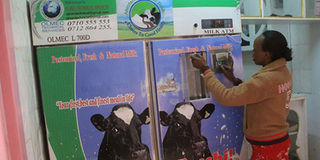Promote ‘less is more’ mantra so as to drive consumption growth

Nancy Wambugu vends milk from an ATM machine in Nyeri Town on March 3, 2017. Such developments are helping create a friendly environment through cutting single-use plastic packaging. PHOTO | FILE | NATION MEDIA GROUP
What you need to know:
- There is a need for sustained joint efforts by stakeholders in manufacturing, retailing and the government in driving sustainable new business and regulatory models.
- In the Philippines, Unilever unveiled shampoo and conditioner refilling stations that is also cutting single-use plastic packaging and brought home affordable products.
While Kenya’s growth numbers are looking up at above six per cent, the common man is struggling to make ends meet.
The woes have been compounded by higher prices of consumables relative to its peers such as Nigeria and Ghana, where Kenya’s average cost per item is up Sh0.50 and Sh0.20 respectively.
These scenarios are shifting spending patterns and how manufacturers are delivering their products to the market.
Kenyans make less shopping trips at an average of 300 a year, reveals a household survey by Kantar, a research consultancy firm, which places the trips in Nigeria and Ghana at 390 and 560 respectively.
The Kantar findings have implications on how dealers and manufacturers of fast-moving consumer goods should package and deliver their products.
The Kantar study showed that 80 per cent of low-income households' spend on local brands was on packs of at least 100 grammes, especially on home and personal-care products.
AFFORDABILITY
The average consumption of the big-pack has grown faster than the small-packaged products, suggesting consumers are looking for value in a market trend that has seen many local brands cashing in strongly on the back of right price points.
The price points of Sh5, Sh10, Sh50 and Sh100 are where the bulk of non-monthly purchase happens.
Consumers are also becoming increasingly savvy in seeking affordable but quality products, making the case for the need for cheaper delivery channels.
This has ushered in the business model of refill: “Buy what you need.” These approaches hinge on delivery models such as dispensers, which are becoming fashionable as businesses seek delivery channels that foster convenience and affordability.
A good case is the growth of fresh milk and cooking oil “ATMs” in Kenya, which are not only helping create a friendly environment through cutting single-use plastic packaging, but are also delivering affordable products to consumers battling against income that is trailing inflation.
INNOVATION
In the Philippines, Unilever unveiled shampoo and conditioner refilling stations that is also cutting single-use plastic packaging and brought home affordable products.
Teaching consumers right levels of product usage is taking centre-stage in the quest for affordability.
Examples are packs with dosage amounts automatically understood such as Royco cubes or ideas like the brand “LESS”, launched in the Netherlands by Eric Smeding, an “intrapreneur”.
It is leading a home-grown Unilever start-up that seeks to change how people use detergents.
His dosage device may see consumers using less of what we sell – but in a more sustainable way.
Under “LESS”, consumers get a device where they simply have to press once, twice or thrice to get the right amount of detergent powder for their wash loads.
“Everyone does laundry, yet 90 per cent get the detergent dosage wrong,” says Mr Smeding.
WASTE MANAGEMENT
Reuse is also gaining currency in the aim for affordability. A coalition of firms - including Unilever, Carrefour, UPS and TerraCycle - have come together to be part of LOOP, a global circular shopping platform designed to eliminate the idea of waste by transforming the products and packaging of everyday items from single-use to durable, multi-use packs.
This is also working in Kenya through a pact between Unilever and Mr Green Africa to recycle plastic containers and cut pollution.
Mr Green Africa uses waste to manufacture products such as buckets and water tanks while Unilever’s products such as Blue Band and Vaseline are packaged in the recycled plastics, allowing cheaper packaging whose benefits are transferred to consumers in the form of affordable products.
In sum, there is a need for sustained joint efforts by stakeholders in manufacturing, retailing and the government in driving sustainable new business and regulatory models, which deliver affordable products and services that ultimately lift consumption of quality products and economic growth.
Marella is the beauty and personal care director at Unilever East Africa ([email protected]); while Igbinadolor is a Consumer Insights expert and the Director of Worldpanel division, Kantar East Africa.




